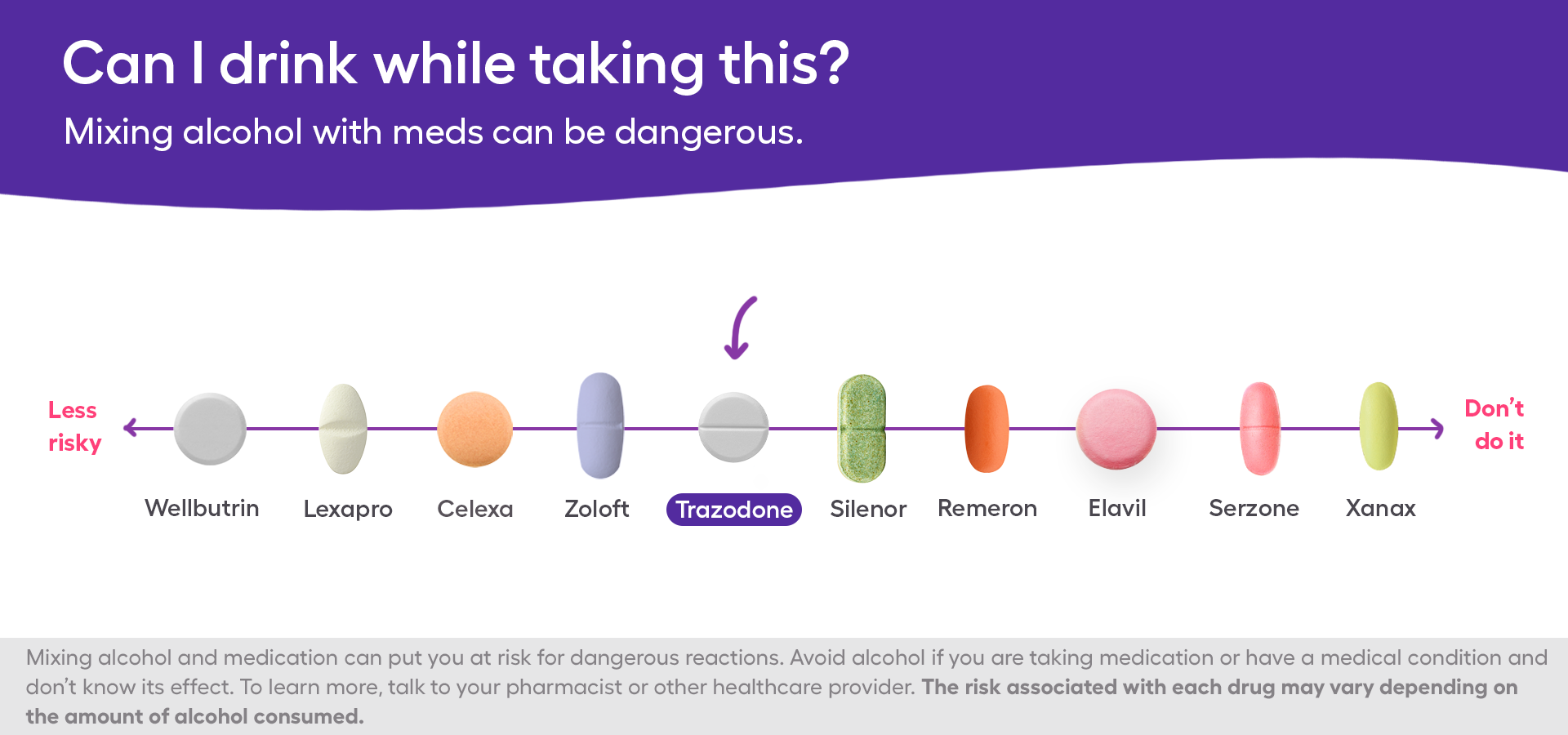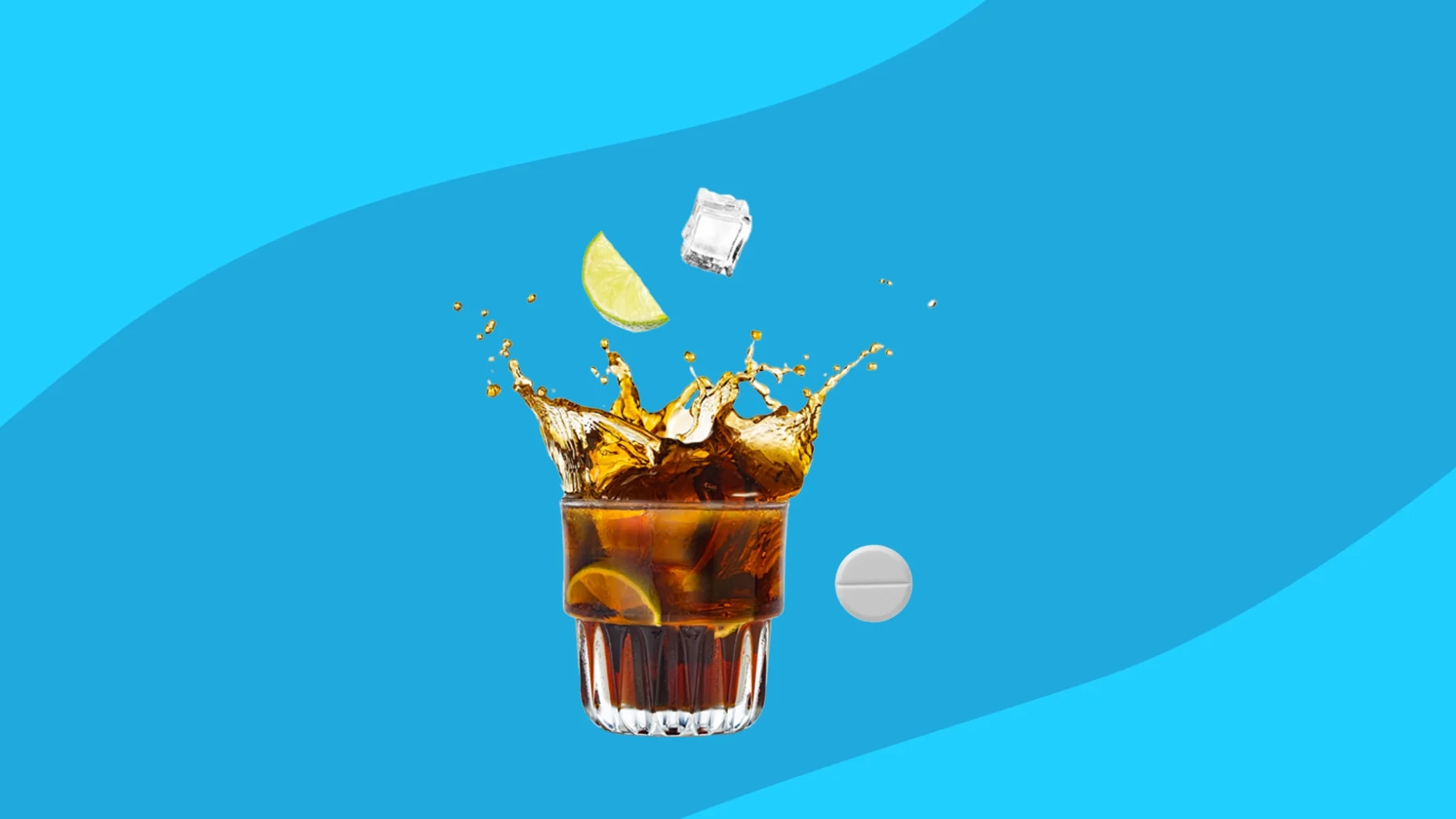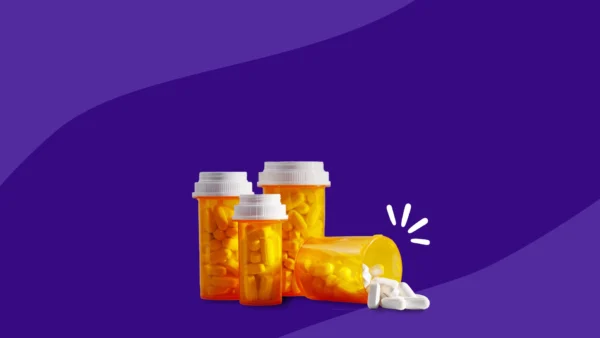Key takeaways
Mixing trazodone and alcohol, both CNS depressants, can increase risks of severe drowsiness and dizziness.
The combination may lead to severe short-term effects, such as an increased risk of overdose, heart rate changes, and impaired coordination. Long-term effects may include worsened depression, liver damage, and an increased risk of dependency and withdrawal symptoms.
Healthcare providers advise against drinking alcohol while taking trazodone due to potential serious side effects and long-term health risks. Wait at least a couple of days after stopping trazodone to drink alcohol.
Trazodone is a prescription serotonin antagonist and reuptake inhibitor (SARI) that is FDA-approved to treat major depressive disorder. Also sold under brand names like Desyrel and Oleptro, this medication affects certain chemicals (or neurotransmitters) in your brain to help alleviate symptoms of depression.
Like most antidepressants, trazodone is meant to be taken daily on a long-term basis. So, you’re likely to find yourself at a social event where alcoholic drinks are being served at some point. Is it safe to partake in a glass of wine or beer? Experts don’t recommend combining trazodone and alcohol. Here’s why.
Can you mix trazodone and alcohol?
Mixing trazodone and alcohol is not recommended. Both trazodone and alcohol act as central nervous system (CNS) depressants, meaning they can slow down brain activity. Drinking while taking this medication can amplify sedative effects, leading to drowsiness and dizziness.
Typically, the more alcohol you consume or the higher your dosage of trazodone when mixing the two, the more severe and potentially life-threatening the side effects can be. The FDA label for trazodone clearly warns against consuming alcohol while taking trazodone. In some cases, death from an overdose has been reported after mixing trazodone with a CNS depressant such as alcohol.
Trazodone has a half-life of about 10 to 12 hours, meaning that’s how long it takes for half of the drug to be eliminated from the body. It’s generally recommended to wait at least 48 hours after your last dose of trazodone before consuming alcohol to allow ample time for the medication to be cleared from your system.

Trazodone and alcohol interaction short-term effects
Mixing trazodone with alcohol can create dangerous health risks. Short-term effects range from increased sleepiness to serious heart problems.
Increased sedation
Mixing trazodone and alcohol can lead to extreme drowsiness or sedation. The increased sedation caused by mixing trazodone and alcohol can hinder your ability to perform tasks that require your full attention, like driving or operating machinery. As a result, mixing the two substances could lead to serious accidents.
Impaired coordination and thinking
The combination of alcohol and trazodone can also lead to impaired coordination and reaction time. Thinking may become cloudy, focusing may become harder, and decision-making abilities may be reduced, increasing the potential for accidents while driving or doing risky activities.
Increased risk of overdose
The dangers of mixing these two substances may include an increased risk of overdose, as alcohol can intensify trazodone’s effects. Drinking alcohol may also lead to careless behavior, which may lead to taking more trazodone than prescribed. Symptoms of an overdose might involve slowed breathing (respiratory depression), headache, seizures, and chest pain. An overdose often requires immediate medical attention to prevent severe outcomes, including coma and death.
Heart rate problems
Trazodone may cause a fast or irregular heartbeat as a potential side effect. People who have a history of a heart rhythm problem called QT prolongation may need to avoid trazodone. Along the same lines, alcohol can also lead to an irregular or fast heart rhythm. When taken together, trazodone and alcohol can amplify these potential effects on heart rate.
Low blood pressure
Trazodone can cause orthostatic hypotension—a condition in which blood pressure drops significantly when standing up from sitting or lying down. Alcohol can also lower blood pressure by widening blood vessels, which may worsen this effect. Mixing the two may also lead to dangerous falls and injuries due to increased dizziness and sudden blood pressure drops, which is another reason it’s best to avoid combining them.
Increased risk of bleeding
Trazodone can increase the risk of bleeding, especially when used with substances that can also increase the risk of bleeding, such as nonsteroidal anti-inflammatory drugs (NSAIDs) and warfarin. Alcohol is also known to have blood-thinning effects. Although there are no reports of severe bleeding from mixing trazodone and alcohol, there is a possibility of an increased bleeding risk while taking trazodone with alcohol.
Trazodone and alcohol interaction long-term effects
When trazodone is taken with alcohol, the combination can seriously affect mental and physical health over time. Long-term risks include worsened depression, liver damage, and an increased risk of dependency.
Worsened depression
Alcohol may affect how well trazodone works to manage a major depressive disorder. As a result, long-term alcohol consumption may worsen depression or other mental health conditions, such as anxiety, potentially counteracting the benefits of trazodone. It’s important to consider the effects of alcohol consumption on mental health when using trazodone for depression.
Liver problems
Trazodone is mainly processed or metabolized by enzymes in the liver. Some cases of liver injury or other liver problems have been reported in people taking trazodone, usually after several months of treatment. In rare cases, complete liver failure has occurred after taking trazodone. Alcohol is also known to cause liver problems, especially in people who drink heavily long-term. Some people with a long history of heavy drinking may find their liver problems getting worse while taking trazodone.
Increased risk of physical dependence and withdrawal
Interestingly, trazodone is sometimes used off-label to treat alcohol withdrawal symptoms. However, the long-term use of trazodone alongside consistent alcohol consumption can increase the risk of developing physical dependence on these substances. Dependence means your body gets so used to consuming certain substances that you might feel sick or uncomfortable when you try to stop using them. When stopping trazodone or alcohol consumption, you might feel anxious, agitated, or have trouble sleeping.
Serotonin syndrome
Alcohol can affect how serotonin works in the brain. If you drink heavily and then stop suddenly, it can cause too much serotonin activity, which may lead to serotonin syndrome. Although alcohol withdrawal alone rarely causes this syndrome, trazodone can also increase serotonin levels, so combining this prescription with heavy drinking may increase your risk.
Low sodium levels
Trazodone may cause low sodium levels in the body, leading to a problem called hyponatremia. In addition, people with alcohol use disorder who have a history of chronic alcohol consumption may also experience low sodium levels. Therefore, combining trazodone with chronic alcohol use may raise the risk of developing low sodium levels. Symptoms of low sodium levels include nausea, headaches, confusion, and, in severe cases, seizures and coma. Watch for potential symptoms and seek medical advice if you have a history of low sodium levels before using trazodone.
Risks of mixing alcohol with antidepressants
Besides trazodone, many antidepressants carry a risk of adverse effects when combined with alcohol. Alcohol can often magnify the common side effects of many antidepressants—specifically those related to the central nervous system. These effects may include altered judgment, coordination, motor skills, and reaction time. There’s also a potential risk of increased sedation or drowsiness.
Different classes of antidepressants interact with alcohol in various ways. While most antidepressants help increase serotonin levels, they may work in different ways and have different effects on other neurotransmitters.
- Monoamine oxidase inhibitors (MAOIs): Combining these with alcohol might lead to serious adverse effects, such as high blood pressure or even a hypertensive crisis.
- Tricyclic antidepressants (TCAs): These medications may cause impaired coordination and a potential increase in depressive symptoms when mixed with alcohol.
- Selective serotonin reuptake inhibitors (SSRIs): Mixing alcohol with SSRIs may cause increased sedation and other amplified side effects of SSRIs.
- Serotonin-norepinephrine reuptake inhibitors (SNRIs): Similar to SSRIs, these medications may increase sedation and affect motor control, especially when combined with alcohol.
- Atypical antidepressants: The antidepressants have varying effects when mixed with alcohol, some of which might include increased drowsiness and dizziness.
Alcohol may also interfere with the therapeutic effects of antidepressants, potentially weakening their overall effects in treating conditions like depression. Healthcare providers typically recommend against drinking alcohol while on antidepressants to minimize potential adverse effects.
The exact risks can vary depending on your health, the type of antidepressant taken, and the amount of alcohol consumed. Always consult a healthcare provider for guidance about drinking alcohol while taking an antidepressant.
Addressing problems with alcohol or substance use
If you or a loved one is struggling with alcohol or substance use, you may want to seek help from healthcare professionals. Various treatment options are available for those living with trazodone abuse or alcohol addiction.
Often, the first stage of recovery is detoxification, which should take place under medical supervision to ensure safety. Support can continue through inpatient or outpatient programs, in which individuals can receive personalized care.
Inpatient treatment centers provide a structured environment for individuals to focus on their recovery without the distractions or triggers of daily life. Meanwhile, outpatient programs allow individuals to maintain their work or family responsibilities while receiving treatment. A person with alcohol or substance use disorder may need to explore different treatment programs and choose the one that fits their situation best.
Loved ones may consider interventions to encourage someone to start treatment. Whether it’s trazodone or alcohol abuse, treatment typically includes therapy, support groups, and education about substance abuse. These resources can help empower individuals to understand their condition and find strategies to maintain long-term sobriety.
The bottom line: Mixing trazodone and alcohol has risks
If you’re thinking about combining trazodone with alcohol, you’ll want to understand the risks involved. Both substances are central nervous system depressants, which means they can significantly reduce brain activity. Alcohol can amplify the side effects of trazodone, increasing the risk of drowsiness, impaired coordination, and other serious events like an overdose. Long-term side effects of mixing trazodone and alcohol may include worsened depression and liver problems.
While one person might react differently to alcohol and trazodone from another person, healthcare providers generally recommend avoiding alcohol altogether while taking trazodone. If you’re stopping treatment with trazodone with guidance from a healthcare provider, wait at least a couple of days to clear the drug from your body before drinking alcohol.
Sources
- Desyrel highlights of prescribing information, U.S. Food and Drug Administration (2018)
- Antidepressant properties of trazodone, Clinical Pharmacology (1982)
- Alcohol’s effects on the cardiovascular system, Alcohol Research (2017)
- Alcohol potentiates orthostatic hypotension: implications for alcohol-related syncope, Circulation (2000)
- Influence of alcohol consumption on blood coagulation in rotational thromboelastometry (ROTEM): an in-vivo study, Korean Journal of Anesthesiology (2020)
- Trazodone, LiverTox (2020)











